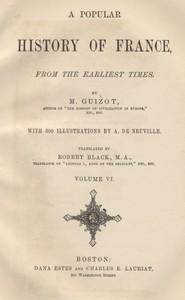|
|
Read this ebook for free! No credit card needed, absolutely nothing to pay.Words: 143516 in 11 pages
This is an ebook sharing website. You can read the uploaded ebooks for free here. No credit cards needed, nothing to pay. If you want to own a digital copy of the ebook, or want to read offline with your favorite ebook-reader, then you can choose to buy and download the ebook.

: A Popular History of France from the Earliest Times Volume 3 by Guizot Fran Ois Neuville Alphonse Marie De Illustrator Black Robert Translator - France History France@FreeBooksTue 06 Jun, 2023 LIST OF STEEL ENGRAVINGS. WOOD-CUTS: Accordingly, in November, 1382, the King of France and his army marched into Flanders. Several towns, Cassel, Bergues, Gravelines, and Turnhout, hastily submitted to him. The men-at-arms hurried up immediately, and striking the hands of the fellow with the butts of their lances, made him let go the bridle. As he had the appearance of a poor madman, and nothing more, he was allowed to go without any questioning, and he followed the king for nearly half an hour, repeating the same cry from a distance. The king was much troubled at this sudden apparition; and his head, which was very weak, was quite turned by it. Nevertheless the march was continued. When the forest had been traversed, they came to a great sandy plain, where the rays of the sun were more scorching than ever. One of the king's pages, overcome by the heat, had fallen asleep, and the lance he carried fell against his helmet, and suddenly caused a loud clash of steel. "The king shuddered; and then he was observed, rising in his stirrups, to draw his sword, touch his horse with the spur, and make a dash, crying, 'Forward upon these traitors! They would deliver me up to the enemy!' Every one moved hastily aside, but not before some were wounded; it is even said that several were killed, among them a bastard of Polignac. The king's brother, the Duke of Orleans, happened to be quite close by. 'Fly, my nephew d'Orleans,' shouted the Duke of Burgundy: 'my lord is beside himself. My God! let some one try and seize him!' He was so furious that none durst risk it; and he was left to gallop hither and thither, and tire himself in pursuit of first one and then another. At last, when he was weary and bathed in sweat, his chamberlain, William de Martel, came up behind and threw his arms about him. He was surrounded, had his sword taken from him, was lifted from his horse, and laid gently on the ground, and then his jacket was unfastened. His brother and his uncles came up, but his eyes were fixed and recognized nobody, and he did not utter a word. 'We must go back to Le Mans,' said the Dukes of Berry and Burgundy: 'here is an end of the trip to Brittany.' On the way they fell in with a wagon drawn by oxen; in this they laid the King of France, having bound him for fear of a renewal of his frenzy, and so took him back, motionless and speechless, to the town." For thirty years, from 1392 to 1422, the crown remained on the head of this poor madman, whilst France was a victim to the bloody quarrels of the royal house, to national dismemberment, to licentiousness in morals, to civil anarchy, and to foreign conquest. Their trial before parliament was prosecuted eagerly, especially in the case of the absent De Clisson, whom a royal decree banished from the kingdom "as a false and wicked traitor to the crown, and condemned him to 'pay a hundred thousand marks of silver, and to forfeit forever the office of constable.'" It is impossible in the present day to estimate how much legal justice there was in this decree; but, in any case, it was certainly extreme severity to so noble and valiant a warrior who had done so much for the safety and honor of France. The Dukes of Burgundy and Berry and many barons of the realm signed the decree; but the king's brother, the Duke of Orleans, refused to have any part in it. Against the other councillors of the king the prosecution was continued, with fits and starts of determination, but in general with slowness and uncertainty. Under the influence of the Dukes of Burgundy and Berry, the parliament showed an inclination towards severity; but Bureau de la Riviere had warm friends, and amongst others, the young and beautiful Duchess of Berry, to whose marriage he had greatly contributed, and John Juvenal des Ursins, provost of the tradesmen of Paris, one of the men towards whom the king and the populace felt the highest esteem and confidence. The king, favorably inclined towards the accused by his own bias and the influence of the Duke of Orleans, presented a demand to parliament to have the papers of the procedure brought to him. Parliament hesitated and postponed a reply; the procedure followed its course; and at the end of some months further the king ordered it to be stopped, and Sires de la Riviere and Neviant to be set at liberty and to have their real property restored to them, at the same time that they lost their personal property and were commanded to remain forever at fifteen leagues' distance, at least, from the court. This was moral equity, if not legal justice. The accused had been able and faithful servants of their king and country. Their imprisonment had lasted more than a year. The Dukes of Burgundy and Berry remained in possession of power. Terms of ransom were concluded; and the sum total was paid through the hands of Bartholomew Pellegrini, a Genoese trader. Before the Count of Nevers and his comrades set out, Bajazet sent for them. "John," said he to the count through an interpreter, "I know that thou art a great lord in thy country, and the son of a great lord. Thou art young. It may be that thou art abashed and grieved at what hath befallen thee in thy first essay of knighthood, and that, to retrieve thine honor, thou wilt collect a powerful army against me. I might, ere I release thee, bind thee by oath not to take arms against me, neither thyself nor thy people. But no; I will not exact this oath either from them or from thee. When thou hast returned yonder, take up arms if it please thee, and come and attack me. Thou wilt find me ever ready to receive thee in the open field, thee and thy men-at-arms. And what I say to thee, I say for the sake of all the Christians thou mayest purpose to bring. I fear them not; I was born to fight them, and to conquer the world." Everywhere and at all times human pride, with its blind arrogance, is the same. Bajazet saw no glimpse of that future when his empire would be decaying, and held together only by the interested protection of Christian powers. After paying dearly for their errors and their disasters, Count John of Nevers and his comrades in captivity re-entered France in February, 1398, and their expedition to Hungary was but one of the last vain ventures of chivalry in the great struggle that commenced in the seventh century between Islamry and Christendom. John the Fearless, Count of Nevers, his son and successor in the dukedom of Burgundy, was not slow to prove that there was reason to regret his father. His expedition to Hungary, for all its bad leadership and bad fortune, had created esteem for his courage and for his firmness under reverses, but little confidence in his direction of public affairs. He was a man of violence, unscrupulous and indiscreet, full of jealousy and hatred, and capable of any deed and any risk for the gratification of his passions or his fancies. At his accession he made some popular moves; he appeared disposed to prosecute vigorously the war against England, which was going on sluggishly; he testified a certain spirit of conciliation by going to pay a visit to his cousin, the Duke of Orleans, lying ill at his castle of Beaute, near Vincennes; when the Duke of Orleans was well again, the two princes took the communion together, and dined together at their uncle's, the Duke of Berry's; and the Duke of Orleans invited the new Duke of Burgundy to dine with him the next Sunday. The Parisians took pleasure in observing these little matters, and in hoping for the re-establishment of harmony in the royal family. They were soon to be cruelly undeceived. On the 23d of November, 1407, the Duke of Orleans had dined at Queen Isabel's. He was returning about eight in the evening along Vieille Rue du Temple, singing and playing with his glove, and attended by only two squires riding one horse, and by four or five varlets on foot, carrying torches. It was a gloomy night; not a soul in the streets. When the duke was about a hundred paces from the queen's hostel, eighteen or twenty armed men, who had lain in ambush behind a house called Image de Notre-Dame, dashed suddenly out; the squires' horse took fright and ran away with them; and the assassins rushed upon the duke, shouting, "Death! death!" "What is all this?" said he; "I am the Duke of Orleans." "Just what we want," was the answer; and they hurled him down from his mule. He struggled to his knees; but the fellows struck at him heavily with axe and sword. A young man in his train made an effort to defend him, and was immediately cut down; and another, grievously wounded, had but just time to escape into a neighboring shop. A poor cobbler's wife opened her window, and, seeing the work of assassination, shrieked, "Murder! murder!" "Hold your tongue, you strumpet!" cried some one from the street. Others shot arrows at the windows where lookers-on might be. A tall man, wearing a red cap which came down over his eyes, said in a loud voice, "Out with all lights, and away!" The assassins fled at the top of their speed, shouting, "Fire! fire!" throwing behind them foot-trippers, and by menaces causing all the lights to be put out which were being lighted here and there in the shops. The duke was quite dead. One of his squires, returning to the spot, found his body stretched on the road, and mutilated all over. He was carried to the neighboring church of Blancs-Manteaux, whither all the royal family came to render the last sad offices. The Duke of Burgundy appeared no less afflicted than the rest. "Never," said he, "was a more wicked and traitorous murder committed in this realm." The provost of Paris, Sire de Tignouville, set on foot an active search after the perpetrators. He was summoned before the council of princes, and the Duke of Berry asked him if he had discovered anything. "I believe," said the provost, "that if I had leave to enter all the hostels of the king's servants, and even of the princes, I could get on the track of the authors or accomplices of the crime." He was authorized to enter wherever it seemed good to him. He went away to set himself to work. The Duke of Burgundy, looking troubled and growing pale, "Cousin," said the King of Naples, Louis d'Anjou, who was present at the council, "can you know aught about it? You must tell us." The Duke of Burgundy took him, together with his uncle, the Duke of Berry, aside, and told them that it was he himself who, tempted of the devil, had given orders for this murder. "O God!" cried the Duke of Berry, "then I lose both my nephews!" The Duke of Burgundy went out in great confusion, and the council separated. Research brought about the discovery that the crime had been for a long while in preparation, and that a Norman nobleman, Raoul d'Auquetonville, late receiver-general of finance, having been deprived of his post by the Duke of Orleans for malversation, had been the instrument. The council of princes met the next day at the Hotel de Nesle. The Duke of Burgundy, who had recovered all his audacity, came to take his seat there. Word was sent to him not to enter the room. Duke John persisted; but the Duke of Berry went to the door and said to him, "Nephew, give up the notion of entering the council; you would not be seen there with pleasure." "I give up willingly," answered Duke John; "and that none may be accused of putting to death the Duke of Orleans, I declare that it was I, and none other, who caused the doing of what has been done." Thereupon he turned his horse's head, returned forthwith to the Hotel d'Artois, and, taking only six men with him, he galloped without a halt, except to change horses, to the frontier of Flanders. The Duke of Bourbon complained bitterly at the council that an immediate arrest had not been ordered. The Admiral de Brabant, and a hundred of the Duke of Orleans' knights, set out in pursuit, but were unable to come up in time. Neither Raoul d'Anquetonville nor any other of the assassins was caught. The magistrates, as well as the public, were seized with stupor in view of so great a crime and so great a criminal. Nor was Juvenal mistaken. The opposition to the yoke of the Burgundians was daily becoming more and more earnest and general. The butchers attempted to stein the current; but the carpenters took sides against them, saying, "We will see which are the stronger in Paris, the hewers of wood or the fellers of oxen." The parliament, the exchequer-chamber, and the Hotel-de-Ville demanded peace; and the shouts of Peace! peace! resounded in the streets. A great crowd of people assembled on the Greve; and thither the butchers came with their company of about twelve hundred persons, it is said. They began to speak against peace, but could not get a hearing. "Let those who are for it go to the right," shouted a voice, "and those who are against it to the left!" But the adversaries of peace durst not risk this test. The Duke of Burgundy could not help seeing that he was declining rapidly; he was no longer summoned to the king's council; a watch was kept upon his house; and he determined to go away. On the 23d of August, 1413, without a word said, even to his household, he went away to the wood of Vincennes, prevailing on the king to go hawking with him. There was a suspicion that the duke meant to carry off the king. Juvenal des Ursins, with a company of armed burgesses, hurried off to Vincennes, and going straight to the king, said, "Sir, come away to Paris; it is too hot to be out." The king turned to go back to the city. The Duke of Burgundy was angry, saying that the king was going a-hawking. "You would take him too far," rejoined Juvenal; "your people are in travelling dress, and you have your trumpeters with you." Free books android app tbrJar TBR JAR Read Free books online gutenberg More posts by @FreeBooks
: The Winning of the West Volume 2 From the Alleghanies to the Mississippi 1777-1783 by Roosevelt Theodore - Northwest Old History; West (U.S.) History; United States Territorial expansion@FreeBooksTue 06 Jun, 2023

: The Winning of the West Volume 1 From the Alleghanies to the Mississippi 1769-1776 by Roosevelt Theodore - Northwest Old History; West (U.S.) History; United States Territorial expansion@FreeBooksTue 06 Jun, 2023
|
Terms of Use Stock Market News! © gutenberg.org.in2025 All Rights reserved.






